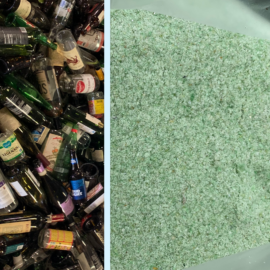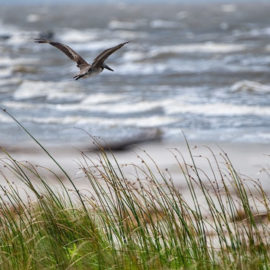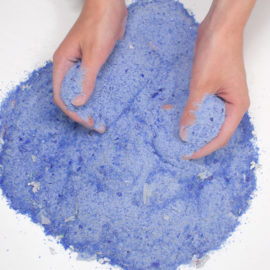
People are looking at anything that can help save the coasts. Glass now enters the competition.
Both Louisiana’s coast and glass are fragile. But combined, they might be strong enough to help save the state. Researchers primarily from Tulane want to find out. They’re studying whether recycled glass turned into sand can help slow land loss devastating Louisiana’s coast. The National Science Foundation awarded the researchers $5 million this week to further their work, part of a project called ReCoast. ReCoast is a collaboration between science and engineering faculty at Tulane and New Orleans’ sole glass recycling center, Glass Half Full. This is the second grant the project has received from NSF. The first one a year ago, amounting to $750,000, was used to study the potential uses of recycled glass and to establish a connection with communities.
nola.com

image via ReCoast
The research has been promising as the glass meets many of the needs to grow grass.
According to a statement from Tulane announcing the grant, their research so far has “shown that the material can grow native marsh grasses and willow trees, is non-toxic to marine life and can resist erosion better than silt.” They can now seek to expand the project to a larger scale. “Solving our land loss crisis requires the convergence of all types of ideas,” Julie Albert, an associate professor of chemical and biomolecular engineering, said in the statement. The team of researchers numbers over 20, and includes faculty from Jackson State University, LSU, the University of Texas – Rio Grande Valley and Bard College. It includes a wide array of specialists, from water quality assessment to community engagement through service learning. Glass Half Full was founded in 2020 by Tulane alumni Franziska Trautmann, who studied chemical engineering, and Max Steitz, who studied international relations. The company recycles over 150,000 pounds of glass every month. “Coastal erosion negatively impacts the livelihoods of residents in coastal communities and reduces the resilience of inland communities to withstand rising sea levels and increasingly severe storms,” Trautmann said in the statement.
The glass has been tested locally in areas near or in the water.
Members of the project have already tested the glass sand’s use in the Big Branch Marsh National Wildlife Refuge in St. Tammany Parish and at the Pointe-au-Chien Tribe’s community in Lafourche and Terrebonne parishes. Researchers conducted tests to ensure that the sand wouldn’t be harmful to plants or animals, and that it wouldn’t erode away easily. ReCoast will focus on carrying out restoration projects for the next two years, and plans to include the Lower Ninth Ward in New Orleans in its restoration efforts. The project’s team also hopes that others will see the benefits of recycling glass, and begin investing in this technology. “We know what happens if we do nothing: swamps will turn into lakes, homes and businesses will literally be washed away with the land, and the intrusion of salt water into freshwater areas will kill wildlife, all further hastening coastal land loss,” Albert said.
Since the city does not recycle glass this is a good use for all the bottles and such that are made of glass.



